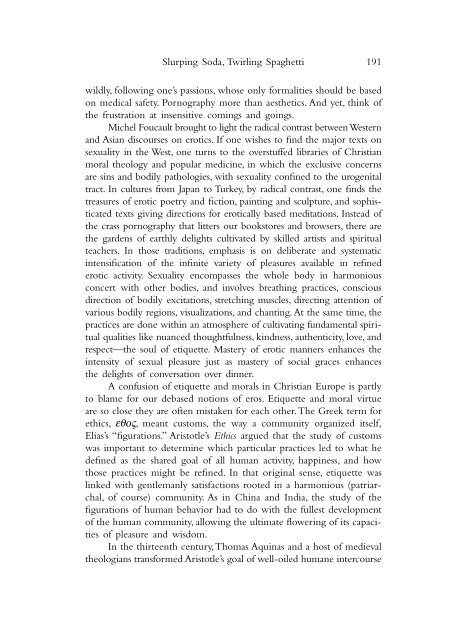You also want an ePaper? Increase the reach of your titles
YUMPU automatically turns print PDFs into web optimized ePapers that Google loves.
Slurping Soda, Twirling Spaghetti<br />
191<br />
wildly, following one’s passions, whose only formalities should be based<br />
on medical safety. Pornography more than aes<strong>the</strong>tics. And yet, think <strong>of</strong><br />
<strong>the</strong> frustration at insensitive comings and goings.<br />
Michel Foucault brought to light <strong>the</strong> radical contrast between Western<br />
and Asian discourses on erotics. If one wishes to find <strong>the</strong> major texts on<br />
sexuality in <strong>the</strong> West, one turns to <strong>the</strong> overstuffed libraries <strong>of</strong> Christian<br />
moral <strong>the</strong>ology and popular medicine, in which <strong>the</strong> exclusive concerns<br />
are sins and bodily pathologies, with sexuality confined to <strong>the</strong> urogenital<br />
tract. In cultures from Japan to Turkey, by radical contrast, one finds <strong>the</strong><br />
treasures <strong>of</strong> erotic poetry and fiction, painting and sculpture, and sophisticated<br />
texts giving directions for erotically based meditations. Instead <strong>of</strong><br />
<strong>the</strong> crass pornography that litters our bookstores and browsers, <strong>the</strong>re are<br />
<strong>the</strong> gardens <strong>of</strong> earthly delights cultivated by skilled artists and spiritual<br />
teachers. In those traditions, emphasis is on deliberate and systematic<br />
intensification <strong>of</strong> <strong>the</strong> infinite variety <strong>of</strong> pleasures available in refined<br />
erotic activity. Sexuality encompasses <strong>the</strong> whole body in harmonious<br />
concert with o<strong>the</strong>r bodies, and involves breathing practices, conscious<br />
direction <strong>of</strong> bodily excitations, stretching muscles, directing attention <strong>of</strong><br />
various bodily regions, visualizations, and chanting. At <strong>the</strong> same time, <strong>the</strong><br />
practices are done within an atmosphere <strong>of</strong> cultivating fundamental spiritual<br />
qualities like nuanced thoughtfulness, kindness, au<strong>the</strong>nticity, love, and<br />
respect—<strong>the</strong> soul <strong>of</strong> etiquette. Mastery <strong>of</strong> erotic manners enhances <strong>the</strong><br />
intensity <strong>of</strong> sexual pleasure just as mastery <strong>of</strong> social graces enhances<br />
<strong>the</strong> delights <strong>of</strong> conversation over dinner.<br />
A confusion <strong>of</strong> etiquette and morals in Christian Europe is partly<br />
to blame for our debased notions <strong>of</strong> eros. Etiquette and moral virtue<br />
are so close <strong>the</strong>y are <strong>of</strong>ten mistaken for each o<strong>the</strong>r. The Greek term for<br />
ethics, eqoV, meant customs, <strong>the</strong> way a community organized itself,<br />
Elias’s “figurations.” Aristotle’s Ethics argued that <strong>the</strong> study <strong>of</strong> customs<br />
was important to determine which particular practices led to what he<br />
defined as <strong>the</strong> shared goal <strong>of</strong> all human activity, happiness, and how<br />
those practices might be refined. In that original sense, etiquette was<br />
linked with gentlemanly satisfactions rooted in a harmonious (patriarchal,<br />
<strong>of</strong> course) community. As in China and India, <strong>the</strong> study <strong>of</strong> <strong>the</strong><br />
figurations <strong>of</strong> human behavior had to do with <strong>the</strong> fullest development<br />
<strong>of</strong> <strong>the</strong> human community, allowing <strong>the</strong> ultimate flowering <strong>of</strong> its capacities<br />
<strong>of</strong> pleasure and wisdom.<br />
In <strong>the</strong> thirteenth century, Thomas Aquinas and a host <strong>of</strong> medieval<br />
<strong>the</strong>ologians transformed Aristotle’s goal <strong>of</strong> well-oiled humane intercourse
















